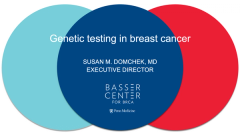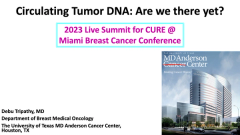
Educated Patient® Breast Cancer Summit at MBCC De-Escalation of Surgery Presentation: March 4, 2023
Watch Dr. Patrick Borgen, from Maimonides Medical Center, discuss the de-escalation of surgery during the CURE Educated Patient® Breast Cancer Summit at MBCC.
Episodes in this series

Among the many treatment advances made in early stage breast cancer care, surgical interventions have become much less invasive over the years, helping patients to live longer and disease free, according to Dr. Patrick Borgen.
At the CURE® Educated Patient® Breast Cancer Summit, held live and virtually at the Miami Breast Cancer Conference, Borgen, chairman of the Department of Surgery at the Maimonides Medical Center in Brooklyn, New York, and also co-chair of the meeting, discussed multiple facets of the current breast cancer treatment landscape. Further, he addressed current survival rates, and the role that “pinkwashing” has played in the space over the years.
Positive Advancements for Breast Cancer Treatment
As physicians advance their understanding of tumor biology and apply that understanding to their patients, surgery continues to be less invasive and less painful for patients with breast cancer who require surgical interventions.
Borgen emphasized the future of breast cancer treatment is a de-escalation of surgery to treat active disease, and the hope that fewer patients will need to be treated with surgery at all.
There are twice as many reported cases of breast cancer than any other solid tumor type, in part, because women who would have perhaps died of other causes are now living longer and developing breast cancer later in life. Despite this increase, the number of deaths due to breast cancer in the United States has remained consistent since the 1950s.
Five-year survival rates for women aged 15 to 49 and initially diagnosed with metastatic breast cancer has doubled in recent years, from 18% in 1992 to 1994 to 36% in 2005 to2012. Some of the advancements that led to increased survival include earlier disease detection and screenings, the development of new drugs and other treatments, a better understanding of disease and tumors, in general, and the participation of patients in larger-scale clinical trials.
The Problem of ‘Pinkwashing’
One current problem for breast cancer treatment, as a whole, is that it remains one of the most expensive in the United States, according to Borgen. This has led to the ubiquity of pinkwashing – when companies take advantage of the desire to support breast cancer foundations and research to boost sales on products that otherwise wouldn’t sell well. This is why random objects in stores are colored pink and donate only a fraction of their profits to breast cancer.
However, he noted, none of these products is of any benefit to a patient with breast cancer, and their association with the space’s philanthropy is, at best, nonsensical and, at worst, dangerous.
The danger of pinkwashing is trivializing the efforts of breast cancer advocates who do such important work, Borgen said. “By painting everything pink we lose the importance of the message,” he said. “We lose the fact that 40,000 women per year die of this disease. So I’m an opponent of pinkwashing.”
For more news on cancer updates, research and education, don’t forget to



















